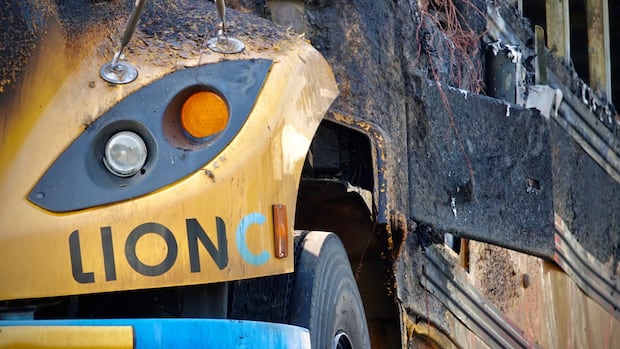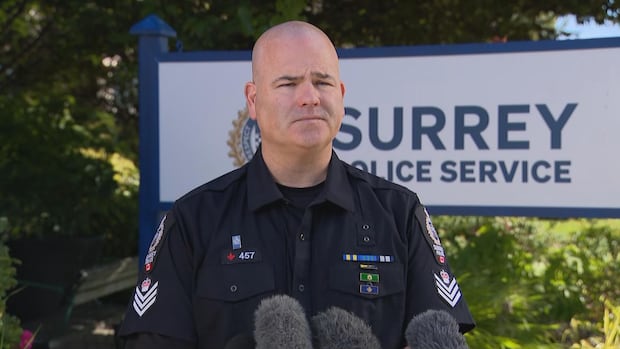After an electric school bus caught fire in Montreal this week, the labour union representing the driver and thousands of others is expressing concern and seeking answers.
“If it happened to my colleague Tuesday, could it also happen to me today? So I have a work tool that is potentially dangerous, and [they’re] not giving me an explanation — not me, or my union,” said Josée Dubé, vice-president of the Confédération des syndicats nationaux (FEESP-CSN).
In the Montreal fire, five children on board the LION school bus and its driver were not harmed. A spokesperson for the city’s fire service said the driver had just turned on the heating system and noticed smoke rising from the vents. He pulled over and got the kids to safety before it went up in flames.
The incident happened near the intersection of Jean-Talon Street West and Victoria Avenue in the city’s Côte-des-Neiges neighbourhood, but it’s not the first in the province.
Another LION school bus caught fire in Ascot Corner, Que., last November. In that case, the director of the intermunicipal fire service, Dany Robitaille, said that the fire started in the vehicle’s heating system. The driver was able to get out of the bus on time, and there were no students onboard.
A LION school bus also caught fire in Huntsville, Ont., shortly after breaking down back in January. In that case, 70 students were safely evacuated.
Firefighters say the blaze that tore through a LION electric school bus in Montreal on Sept.9 was linked to the vehicle’s heating system. The bus operator inspected 200 buses in its fleet and has disabled the defrosting system. But one union representing Quebec bus drivers is calling for all the buses to be inspected.
In all three fires, the bus batteries were not the cause, nor were they affected by the flames.
Montreal firefighters have since confirmed Tuesday’s fire was also linked to the heating system in the bus, which is made by the Quebec-based LION, which has been wrought with financial struggles.
A Quebec Superior Court judge approved the sale of the vehicle-maker to a group of Quebec investors back in May. The judge in that case said the deal was the only option that ensures the struggling manufacturer can keep operating.
More than 200 buses inspected
The school bus operator, First Student, told CBC News it has since inspected more than 200 buses from the manufacturer and found the defrosting system is the likely problem.
As an immediate precaution, the company has disabled the defrosters by removing the switches, thereby neutralizing the manufacturer’s problem, the company says in a statement.

This short-term fix allows these buses to safely remain in service while the company works closely with Transport Canada and the manufacturer on a permanent solution, it says.
The union is demanding all LION buses be inspected. Parents groups are concerned as well.
“Get to the bottom of this right away,” said Katherine Korakakis, head of the English Parents’ Committee Association of Quebec after the Montreal fire.
“They think it’s this — you have to be 100 per cent it’s this. I mean, this isn’t a little thing. And thank God, the fire happened where it did. Imagine it happened on a highway, and the bus was full of children. Imagine that nightmare scenario.”
Transport Canada is investigating
LION refused an interview request from CBC News, but we asked a spokesperson what steps are being taken with the rest of the LION fleet and whether this thermal issue only affects one or more models of electric buses.
In a statement, the spokesperson didn’t answer that question, saying only the precise cause of the fire remains unknown.
LION’s analysis, which is being conducted in collaboration with Transport Canada, is still ongoing. The company’s technical department is working closely with operators, and procedures for preventive inspection measures will be shared with them Thursday, according to the spokesperson, who works for SYRUS, a consulting firm that is handling media relations on behalf of LION.
Transport Canada is aware of the recent incident involving a LionC electric school bus and has launched an investigation under the Motor Vehicle Safety Act, according to Sau Sau Liu, a spokesperson for the federal agency.
“Should Transport Canada identify any public safety concerns stemming from our investigation, Transport Canada will not hesitate to take action,” she said in an email.
Any school bus driver operating a LionC vehicle that smells something burning or sees signs of smoke should stop the vehicle in a safe location, immediately evacuate the bus and, if it’s safe, turn off the high-voltage and 12-volt power supplies, Liu said.
“Overall, school buses have an excellent safety record in Canada and remain the safest means of transporting children to and from school,” she said.
“For everyone’s safety, school boards, teachers and students are encouraged to be familiar with the location of bus fire exits and with fire escape procedures. In the event of an emergency, being prepared can save valuable time and help ensure a safe evacuation.”







